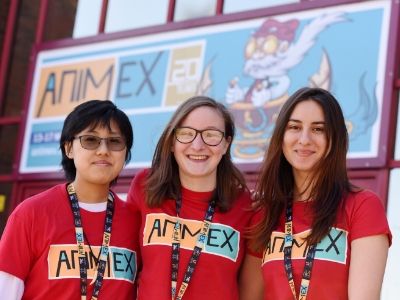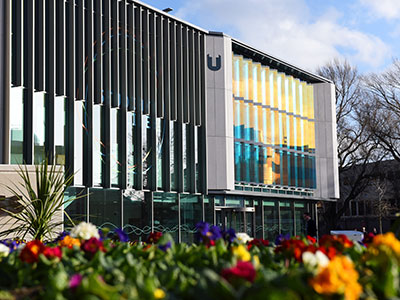Course overview
MA Animation student showreel 2022
MA Animation student showreel 2022
This programme has a strong focus on preparing you for working in the industry as a 3D character animator. It has been designed by staff with a wealth of industry experience and an in-depth knowledge of character animation for film, television and games. Graduates have gone on to work for Industrial Light and Magic, Animal Logic, Blue Zoo, Imaginarium and Rockstar North.
There are three routes you can choose from to gain an MA Animation:
- full-time - 2 years with advanced practice (September and January start)
- full-time - 1 year (September start) or 16 months (January start)
- part-time - 2 years.
Course details
Course structure
Core modules
This module is an in-depth study of acting theory as applied to character animation.
The overall aim is to enable you to create convincing performances using animated characters.
You are encouraged to develop the basic acting principles through an analysis of live action and character animations in terms of the basic psychology of human emotion and acting performance. You learn to understand the differences and similarities of acting theory applied to animation and live action.
Throughout the module, you learn how to put your understanding of acting theory into practice. Using improvised and scripted acting techniques you plan and develop short character animation sequences.
Using the sound stage you have the opportunity to record both scripted and improvised performances and use these videos as reference for your animation.
At the end of the module you will have produced an integrated set of character animation exercises. This portfolio will be used for the purposes of assessment.
You explore the art and science behind body mechanics in animation. You research and analyse the movement of both humans and other elements and apply this knowledge in the production of convincing animation in 3D.
You study the physics of movement, human anatomy, internal and external forces as well as a professional animation workflow.
You develop a deep knowledge of animation workflow through a number of body mechanics exercises, and study and critically analyse a variety of animation styles from realistic to cartoon.
Assessment is a portfolio of body mechanics shots (70%) and an illustrated, reflective, blog (30%).
Animated creatures can take many forms - from cartoon-styles with human personalities, to the recreation of realistic creatures in live action films.
You explore, use and critically analyse the techniques and tools available to today’s animators. You explore both the creative and technical skills required to produce creature (non-human) animation. This include areas such as weight, balance, anatomy and locomotion.
Assessment is a portfolio of creature animations, together with research and observations related to animal/creature behaviours and motions.
You explore methodologies and techniques necessary to create animated facial performances to a professional quality.
You investigate advanced keyframe animation and performance capture pipelines, experimenting with each to create professional pieces of work.
You use audio and dialogue to further enhance the emotional and psychological engagement with the animated character.
You reflect on animation styles in the character performance.
Assessment is an individual portfolio, which includes an animated piece with dialogue to professional industry quality.
Visual and acoustic awareness is essential and knowledge of Autodesk Maya is desirable.
You complete a multidisciplinary group project in your area of interest to create a short film or video game cutscene.
You work in an individual production role within small teams to create an original short film or cutscene, which provide a high-end showpiece for your portfolio.
You undertake a major, in-depth, individual study in an aspect of your animation programme. Your project is drawn from appropriate commercial, industrial, artistic or research-based problem areas and involves research and investigation in relevant aspects of a very specific area of study followed by the production of a major deliverable portfolio of relevant practice based materials from the area of animation. You also produce a written report that contextualises and critically evaluates your final outputs.
Assessment is an ICA 100%. The major deliverable(s) are assessed through a viva. Your research, project process and evaluation is reported by an accompanying written report, which contextualises and evaluates the creative output.
You gain the knowledge and skills to understand the research process in computing and digital media, and the necessary skills to undertake your masters project. You learn how to use and critically evaluate previous academic research, and to generate good evidence material to justify their professional practice. This involves you learning about different research strategies and data generation methods and how they fit into the development lifecycle and the evaluation of the user experience, the use of the academic research literature, and research ethics.
Assessment involves you preparing a research proposal which can form the basis of your master's project.
Advanced practice (2 year full-time MA only)
The internship options are:
Vocational: spend one semester working full-time in industry or on placement in the University. We have close links with a range of national and international companies who could offer you the chance to develop your knowledge and professional skills in the workplace through an internship. Although we cannot guarantee internships, we will provide you with practical support and advice on how to find and secure your own internship position. A vocational internship is a great way to gain work experience and give your CV a competitive edge.
Research: develop your research and academic skills by undertaking a research internship within the University. Experience working as part of a research team in an academic setting. Ideal for those who are interested in a career in research or academia.
Modules offered may vary.
How you learn
You learn about concepts and methods primarily through keynote lectures and tutorials using case studies and examples. Lectures include presentations from guest speakers from industry. Critical reflection is key to successful problem solving and essential to the creative process. You develop your own reflective practice at an advanced level, then test and assess your solutions against criteria that you develop in the light of your research.
How you are assessed
The programme assessment strategy has been designed to assess your subject specific knowledge, cognitive and intellectual skills and transferable skills applicable to the workplace. The strategy ensures that you are provided with formative assessment opportunities throughout the programme which support your summative assessments. There is a mix of practical work (usually in the form of a portfolio of animation tasks), presentations, reflective blogs and written reports. Formative feedback is typically given during lectures, tutorials and summative feedback using on-line methods. The assessments can include individual or group work. The assessment criteria, where appropriate, will include assessment of presentation skills and report writing.
Entry requirements
At least a UK 2.2 honours degree in animation or equivalent.
Other first degree subjects may be accepted when combined with a portfolio of creative work at an acceptable standard.
Get some hints and tips on how to prepare a portfolio
For general information please see our overview of entry requirements
International applicants can find out what qualifications they need by visiting Your Country
Employability
Career opportunities
You have many opportunities to develop your professional skills, links with industry and meet with recruiters through ExpoTees, Animex Festival and Student Futures activities.
Information for international applicants
Qualifications
International applicants - find out what qualifications you need by selecting your country below.
Select your country:
Useful information
Visit our international pages for useful information for non-UK students and applicants.







